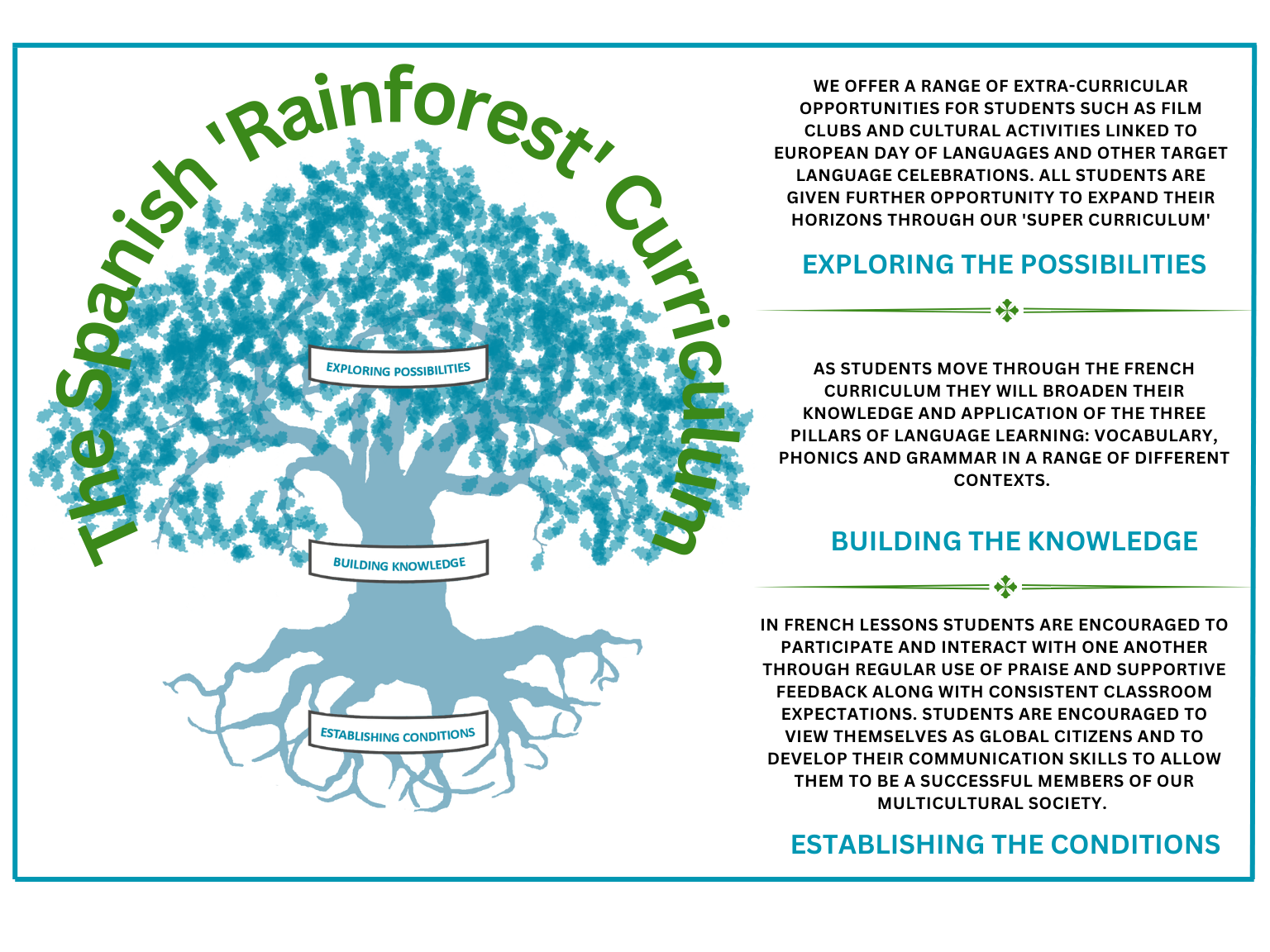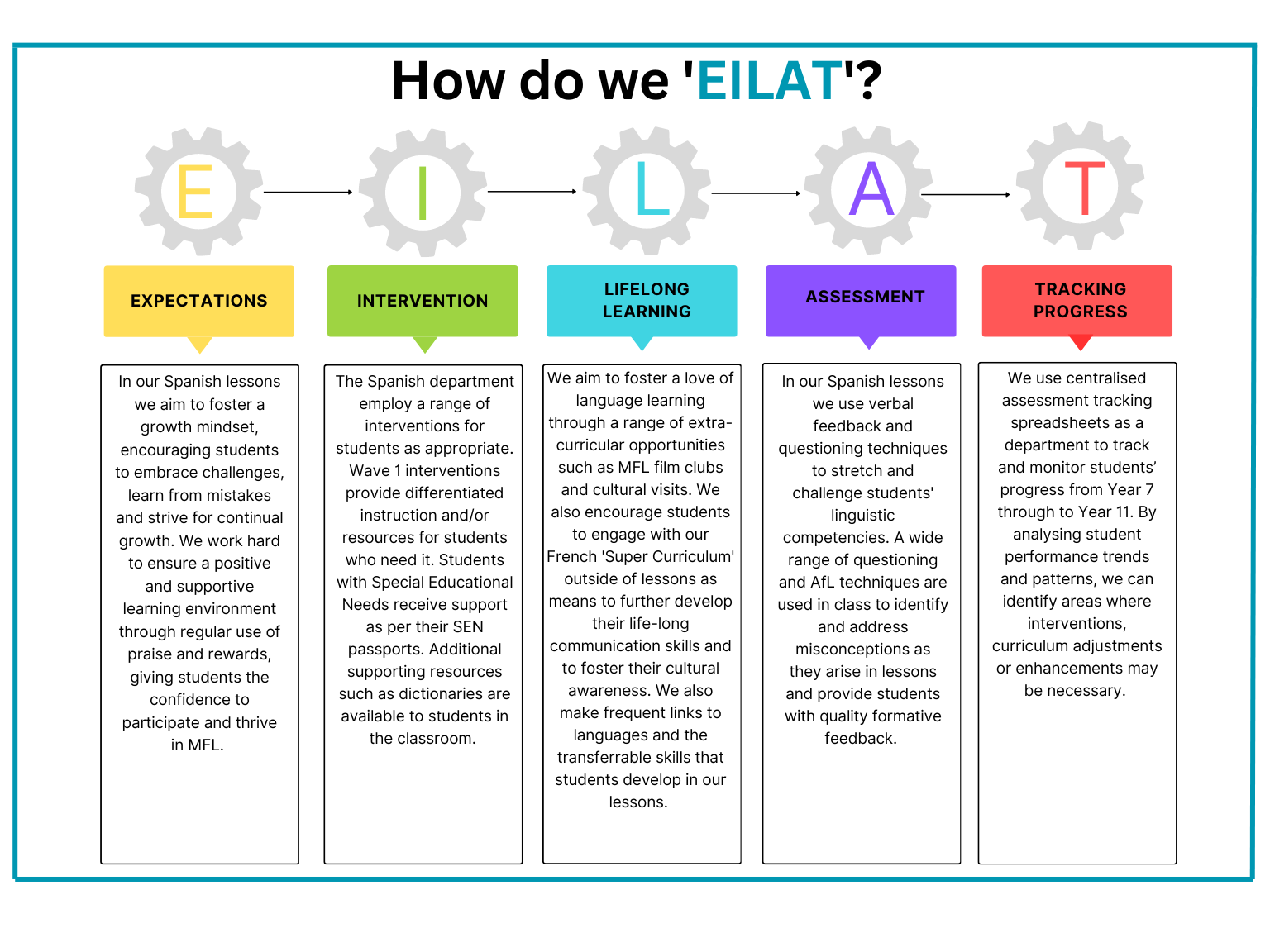Spanish
"One language sets you in a corridor for life. Two languages open every door along the way" (Frank Smith, 1992)
Intent
We see the study of languages as integral to our multicultural society and as a window to the rest of the world. Languages are our bridge out of insularity with wide-ranging uses beyond the classroom throughout our lives.
Through their study of French we aim to:
- Provide students with the means to understand the structure of another language, comparing and contrasting it with their own.
- Provide students with the means to develop and use a wide-ranging and deepening vocabulary in the target language, allowing them to give and justify opinions and take part in discussion about wider issues.
- Provide students with the means to (and necessary knowledge to) speak coherently and confidently in the target language, with increasingly accurate pronunciation and intonation.
- Expose students to different countries’ customs and traditions, allowing them to develop their understanding and tolerance of others and other cultures.
- Equip students with the techniques and strategies they will need to continue to develop their linguistic skills whenever they need to throughout their lives, for work or for pleasure. We believe that communication in a foreign language is a valuable asset for their future careers.

Meta-concepts
The following meta-concepts underpin our curriculum:
- Vocabulary: Students develop the vocabulary knowledge to enable them to communicate in a range of different contexts.
- Phonics: Students develop a clear understanding of phoneme-grapheme (sound-spelling) correspondence in the target language.
- Grammar: Students are able to understand and manipulate a range of common regular and irregular verbs in 3 key time frames, enabling communication about the past, present and future.
- Linguistic competence and creativity: Students develop their listening, speaking, reading, writing and translations skills and are able to use familiar language across different contexts and for different purposes.
- Cultural context: Students develop an understanding of French speaking countries and cultures around the world and how a good working knowledge of French can have a positive impact on their lives.
Implementation
Our French curriculum is designed to build students' vocabulary, phonics and grammar knowledge in a logical sequence with regular revisiting of key language and sounds whilst also allowing students to communicate about a range of topics relevant to their lives. Alongside our curriculum, students can opt to engage in a range of independent enrichment activities from our 'MFL Super Curriculum'.
Key Stage 3
In KS3 (Years 7-9) we have 2 lessons per fortnight.
In year 7 we focus on key phoneme-grapheme correspondences, the conjugation of regular er/ir/re verbs and the common irregular verbs avoir, etre, faire and aller in the first and third person singular and first person plural in the present and near future tenses, and the development of vocabulary relating to self, family, friends, school, free time and local area.
In year 8 we revisit key phonics and expand our verb conjugations to include the full paradigm for regular and key irregular verbs seen in year 7. We also begin conjugating reflexive verbs in the present tense (first and third person singular and first person plural)in the context of daily routine and we begin to look at the past tense in French in the contexts of free time and holidays, using the perfect tense with avoir and etre in the first person singular and plural. Students revisit, deepen and expand their vocabulary for free time activities including digital technologies, film & TV. We also learn about different customs and celebration in Francophone countries.
In year 9 we revisit and reinforce key phonics and expand our verb conjugations to include the full paradigm for regular and irregular verbs in 3 time frames including the modal verbs devoir, pouvoir and vouloir. Students expand their vocabulary to talk about a number of real world issues such as the environment and Healthy Living along with discussing jobs and careers and the place of language learning in the workplace.

Key Stage 4
In KS4 (Years 10 & 11) students have 6 lessons per fortnight of their chosen language(s).
In Years 10 and 11 students will works towards a GCSE qualification with AQA and further deepen their vocabulary and grammar knowledge across a range of themes as follows:
Theme 1: Identity and Culture.
Theme 2: Local, national, international and global areas of interest.
Theme 3: Current and future study and employment.
In addition to revisiting key grammar covered in years 7-9 students will also begin to use the following verb tenses:
•The imperfect tense
•The conditional tense
•The pluperfect tense
•The subjunctive mood
Impact
At Jubilee High School, the Spanish curriculum has been designed to equip students with a good working knowledge of the target language and to foster transferrable skills enabling students to become lifelong language learners and first class communicators. We aim to empower our students to become knowledgeable about languages and how they can positively impact their lives, whilst also developing an understanding and tolerance of different cultures and customs around the world through their study of target language cultures and countries.



